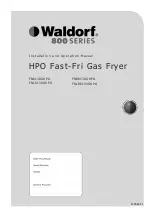
5
ImPoRTAnT:
Do not operate, install, or store dryer where
it will be exposed to water, weather, or at temperatures below
45° F (7° C). Lower temperatures may cause dryer not to
shut off at end of automatic sensor cycles, resulting in longer
drying times.
Installation spacing for recessed area
or closet installation
All dimensions show recommended spacing allowed, with tested
spacing of 0" (0 mm) clearance on sides and rear.
Additional spacing should be considered for ease of installation
■
and servicing.
Additional clearances might be required for wall, door, and floor
■
moldings.
Additional spacing should be considered on all sides of the
■
dryer to reduce noise transfer.
For closet installation, with a door, minimum ventilation
■
openings in the top and bottom of the door are required.
Louvered doors with equivalent ventilitation openings are
acceptable.
Companion appliance spacing should also be considered.
■
34" min.
(864 mm)
1"
(25 mm)
5"
(127 mm)
24 in.
2
(155 cm
2
)
48 in.
2
(310 cm
2
)
3"
(76 mm)
3"
(76 mm)
1"
(25 mm)
closet installation (dryer only):
ELECTRICAL REQUIREMENTS
It is your responsibility:
To contact a qualified electrical installer.
■
To be sure that the electrical connection is adequate and in
■
conformance with the National Electrical Code, ANSI/NFPA 70
- latest edition and all local codes and ordinances.
The National Electrical Code requires a 4-wire power supply
connection for homes built after 1996, dryer circuits involved in
remodeling after 1996, and all mobile home installations.
A copy of the above code standards can be obtained from:
National Fire Protection Association, One Batterymarch Park,
Quincy, MA 02269.
To supply the required 3 or 4 wire, single phase, 120/240
■
volt, 60 Hz, AC only electrical supply (or 3 or 4 wire, 120/208
volt electrical supply, if specified on the serial/rating plate)
on a separate 30-amp circuit, fused on both sides of the line.
Connect to an individual branch circuit. Do not have a fuse in
the neutral or grounding circuit.
Do not use an extension cord.
■
If codes permit and a separate ground wire is used, it is
■
recommended that a qualified electrician determine that the
ground path is adequate.
Electrical connection
To properly install your dryer, you must determine the type of
electrical connection you will be using and follow the instructions
provided for it here.
This dryer is manufactured ready to install with a 3-wire
■
electrical supply connection. The neutral ground conductor
is permanently connected to the neutral conductor (white wire)
within the dryer. If the dryer is installed with a 4-wire electrical
supply connection, the neutral ground conductor must be
removed from the external ground connector (green screw),
and secured under the neutral terminal (center or white wire)
of the terminal block. When the neutral ground conductor is
secured under the neutral terminal (center or white wire) of the
terminal block, the dryer cabinet is isolated from the neutral
conductor.
If local codes do not permit the connection of a neutral
■
ground wire to the neutral wire, see “Optional 3-wire
connection” section.
A 4-wire power supply connection must be used when the
■
appliance is installed in a location where grounding through
the neutral conductor is prohibited. Grounding through the
neutral is prohibited for (1) new branch-circuit installations,
(2) mobile homes, (3) recreational vehicles, and (4) areas
where local codes prohibit grounding through the neutral
conductors.
If using a power supply cord:
Use a UL listed power supply cord kit marked for use with
clothes dryers. The kit should contain:
A UL listed 30-amp power supply cord, rated 120/240 volt
■
minimum. The cord should be type SRD or SRDT and be
at least 4 ft. (1.22 m) long. The wires that connect to
the dryer must end in ring terminals or spade terminals
with upturned ends.
A UL listed strain relief.
■
mobile home - Additional installation requirements:
This dryer is suitable for mobile home installations. The
installation must conform to the Manufactured Home
Construction and Safety Standard, Title 24 CFR, Part 3280
(formerly the Federal Standard for Mobile home construction
and Safety, Title 24, HUD Part 280) or Standard CAN/CSA-Z240
MH.
mobile home installations require:
Metal exhaust system hardware, available for purchase from
■
your dealer. For further information, see “Assistance or
Service” section in your Use and Care Guide.
Special provisions must be made in mobile homes to
■
introduce outside air into dryer. Openings (such as a nearby
window) should be at least twice as large as dryer exhaust
opening.






































